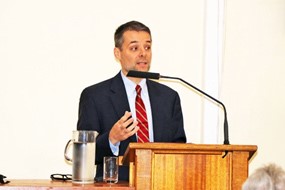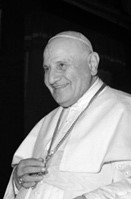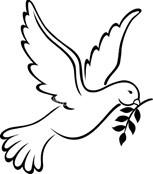As a renowned contemporary theologian he explored the implications of Vatican II and the ministry of Pope Francis. Teachers, principals, clergy, Ministry Co-ordinators and all people of the diocese were invited to share the event.
 Massimo, as with his predecessors, reminded us that living as people of faith and hope is a call to balance and discern complexities and tensions – as in all areas of life – and to continue to trust in the utterly surprising presence of God’s Spirit.
Massimo, as with his predecessors, reminded us that living as people of faith and hope is a call to balance and discern complexities and tensions – as in all areas of life – and to continue to trust in the utterly surprising presence of God’s Spirit.
I invited some members of our diocesan community to send a few words of response to his seminars. What I received was a veritable doctoral thesis! People had been so touched and enthused as to respond quite fully and profoundly. I apologise for recording only snippets and aspects of these responses, implications and pertinent challenges:
About Massimo:
- From his first word to his last on Tuesday I felt that I was in the presence of a man who presents Catholic thinking and sensibility so much in sync with the Spirit-filled gifts of Vatican II and the first Pope Francis.
Francis: a true Vatican II pope
- Massimo’s broad-brush outline of Francis revealed this Pope’s remarkable similarity in silhouette with his predecessor named John. Their pre-papal distance from Rome and their immersion in the existential realms of politics and everyday life had equipped each to lead the Church into genuine dialogue with the modern world.
The context of Vatican II: why it needed to happen
- The pre-Council’s ‘long nineteenth-century of the Church’ was again brought to our attention as it had been by James McEvoy in June. The Vatican’s alliances with anti-modernist forces in a vain attempt to maintain a bygone era of power was coming to an end when, for the first time ever, the majority of Bishops at an Ecumenical Council were non-European.
- John XXIII’s emphases on mercy, ecumenism and the unity of all of humanity prevailed. No longer was a Council to be convened for ‘condemnations’ or a perceived enemy. Rather, there was a crisis in the church’s understanding of modernity. A new language needed to be found for old truths, bringing us ‘up to date’.
Vatican II: a radical transformation
- I was struck by the historical context in which the Catholic Church exists; the trends, teachings, steps forward … the backtracking, conflicts and mistakes of those in power − and yet its evolution, or transformation for the better. One could say a movement from the realm of history into the timeless Kingdom of God. The old vision of the ‘rock of ages’ type of Church that could overcome everything, endure everything and have the last word on everything has given way to a humbler church (in some ways); one hopefully more inclined to dialogue with its times than to dominate them. Here I feel there is hope.
 Following the definition of Papal Infallibility at the First Vatican Council, some thought there was no further need for the Bishops to have a say. After John XXIII called the Council Rome reluctantly drafted Council documents to be rubber-stamped. Instead, they were shredded! Utterly surprisingly, the Vatican II draft document on the Church – which originally commenced with the role of the hierarchy – was, through the Council process, replaced by that which gives primacy to the People of God. Hierarchy became Chapter Three! The People of God took centre stage!
Following the definition of Papal Infallibility at the First Vatican Council, some thought there was no further need for the Bishops to have a say. After John XXIII called the Council Rome reluctantly drafted Council documents to be rubber-stamped. Instead, they were shredded! Utterly surprisingly, the Vatican II draft document on the Church – which originally commenced with the role of the hierarchy – was, through the Council process, replaced by that which gives primacy to the People of God. Hierarchy became Chapter Three! The People of God took centre stage!- Prior to the Council the church was seen as ‘perfect’ and didn’t require change; however, Vatican II encouraged change through focusing on the centrality of God’s Word: biblical scholarship; understanding scriptural context; taking it to heart. It also moved away from its Eurocentric view of the world to one that is global and ecumenical.
Implications of Vatican II
- Primacy of baptism
- Awareness that Jesus announces the Kingdom of God, not the Church
- The Church is provisional, not to serve itself but to bring the good news to, and to serve, all of humanity on its journey to salvation.
- Call for a less clerical church
- The spirit of the documents, not laws, are the defining element
- Among so many insights into the Council documents I found particular resonance with one of contemporary relevance: “there are fundamental human rights the Church has no right to define”. Such rights derive from the creation of every person in the image of God.
- I was heartened to hear Massimo speak of different ecclesiologies, or ways of being church (eg the ecclesiology of schools and health care organisations). As principals of Catholic schools we try to ensure that ‘Jesus is at the heart of all we do’. We strive to serve the needs of others while maintaining an honest correlation between gospel values and daily actions. So we, too, are working to complete the works of Vatican II There are so many examples of how schools are wonderful manifestations of church.
The unique leadership of Pope Francis for our time
- Francis is anti-elitist, believing in a poor church for the poor, not prestige, power and wealth.
 He has taken up John XXIII’s legacy with renewed vigour
He has taken up John XXIII’s legacy with renewed vigour- Francis speaks the Council without naming it explicitly. It is implicit in what he says and does. He (like us) has absorbed it into his DNA.
- In pondering this I came away thinking differently about those who grieve that the Church is backward on issues such as marriage, homosexuality and status of women. These were not mentioned at Vatican II as they were not ‘hot potato’ issues then. In fact, even now, Massimo said, our understanding of these issues is different according to the latitude we live in. It all shows how complex progress is; in a way, so ‘out of our hands’. Considering this, I had an image of Pope Francis being true to himself, deeply-sensitive to the life circumstances of others, but living through these times of not knowing the way forward on everything.
- We need to discern and dialogue. This is a different Pope and a different Church.
Discernment leads to ‘decisions the books don’t necessarily allow’, since we live in a more complicated world, forced to grapple with issues not current fifty years ago.
Helen concludes …
I was so excited by Massimo’s explanation of what keeps him Catholic, despite the flaws in the church today. This question is one I often ponder. For Massimo it is simple:
A healthy liturgical life alongside all sorts of people of prayer within the church [not shopping around]. This combines with the experience of faith in everyday life, making Jesus real and bringing Jesus to others – ‘proclaiming’ by being.
Some challenges noted:
1. To become more familiar with, and better informed about, the Vatican II documents.
2. To fall in love with, and deepen understanding of, our scriptures
3. To realise that, as with Pope Francis, we will be unique in the living out of our ministry call
4. To be more evangelical – put on Jesus-coloured glasses to view the world
5. To ensure our experience of church is ministerial rather than political: of true service to others
6. To seek alignment between what the church says and does – being a more honest church
7. To change from seeing the church as all-complete and all-perfect, and be ready to wait, discern, listen and pray – nourished by the church as sacrament on the way to the Kingdom of God. [100 years for a Council to be implemented, Massimo observed!]
8. To revisit the nature and call of priesthood. [Dr Richard Lennan also raised this in his 2016 seminars]; be a more inclusive, less clerical church
9. To further explore Massimo’s notion of different ecclesiologies, (eg the ecclesiology of the school or healthcare)
10. To reject any notion of being a pure, small, exclusivist church.
Thanks to Sam Hill, Carmel Moore, Michael O’Connor, Paul O’Heir, Lidy Waanders, Helen Whale … and Massimo Faggioli!
Responses collated by Vivien Williams, Co-ordinator, Adult Faith Formation
And there’s more … 2 Twillight Seminars:
8 Sept: Dr Richard Gaillardetz, Boston College, will further develop our understanding of the Council and current church leadership.
16 Nov: Dr John May, specialist in ecumenism and interreligious dialogue, ponders the 500th anniversary of the Reformation by discussing current ecumenical challenges and the imperative of interreligious dialogue.